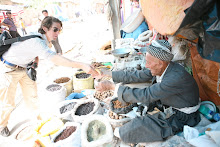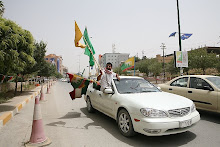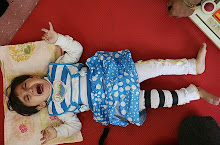Kirkuk sits on one of the largest oil reserves in the Middle East. Because of this it is one of the most disputed cities in the country – it is also one of the most dangerous and sadly one of the poorest. This meant that today we had to increase our security and travelled in convoy with six new guards who fanned out around us. Kidnappings are common and so we had to keep moving. Yesterday a young Syrian suicide bomber was caught nearby and they were expecting another. Again we moved quickly.
We were there to visit the football stadium, which has been transformed into a refugee camp. I say refugee camp, but that implies they fled from somewhere worse. The truth is these people moved back after the liberation hoping to reclaim old homes. This has not happened and now 16,000 families have nowhere to live. They are encouraged to be here in an attempt to change the demography of the city, which would lead to an election victory for the Kurds and in turn win them control of the oil below. Every side is sending its people back in for the same reason and so the election has now been postponed indefinitely. This happened even under Saddam.
The city is split in three: the Arab part, the Kurdish part and the Turcamen part. All three lay claim to the area and all three are at each others throats. Nobody has anywhere else to go, nobody can afford to move or buy a house and everyone is getting angrier. It is a catch 22 – even if they wanted to leave now, they can’t. The worst off seem to be the Kurds but then I wasn't allowed to talk to people in the other sectors, merely drive through - quickly.
Like everywhere else in the country people here are not happy with their leaders, they blame them for many of the problems. However neighbouring countries are also to blame and the vast wealth within the city means that Saudi Arabia, Iran, Syria and Turkey are all sponsoring terrorism in the region. They want either to prevent others from gaining oil, prevent the creation of a larger Kurdish state or simply want to exact revenge. Until security can be improved (which for many reasons seems impossible) no investment will go in, no aid will arrive.
We made it to the Stadium. Never before have I seen such abject poverty and such sadness. The people here live in squalid dark hovels, with no running water and barely any electricity, they often survive off what scraps they can find. They are surrounded everywhere by putrid rubbish and their own waste covers the floor. Everyone here is dying and the stench is unbearable. Almost everyone we spoke to has a terminal disease, is blind or is disfigured. A retarded child huddled in the corner.
Most people wouldn’t talk to us: they are fed up of being promised help yet receiving none. Last week they pelted journalists with rocks because they were sick of people visiting them and nothing happening. It was not easy to film today – in so many ways it felt disrespectful. I felt like a voyeur poking my head in to other peoples misery. Knowing that I would run away and type it up on my shiny laptop only made it worse. However I believe some good can come from this so I continued and spoke to anyone willing to talk back.
One man had an open sewage trench running through his hut, he regularly cements it over, but about every month or so it burst through leaving the whole family knee high in shit. I am not exaggerating – as our translator said when we drew near “Welcome to Hell” - he was right. The city is surrounded by oil wells and black smoke drifts across from all directions. Even as I write this I can only shake my head.
How does one interview people in this situation, what does one ask them? “What needs to change? Is anything being done? How do you feel? Who is to blame? What do you need? Is there any hope?” Such obvious questions, such obvious answers but I asked them anyway. I have a lot to learn.
In another part of the city we were suddenly confronted by police. It’s not unusual for extremists to wear official uniforms and our own guards immediately jumped between us. In the end it turned to be only a matter of jurisdiction but the atmosphere was tense and we were ushered away. Soon after we were stopped at a checkpoint and Rick and I again taken inside for questioning. We were let go in due time but everyone here is nervous, everyone expects the worse.
Sticking with the day’s theme of depression, we moved on to the Shoraz collective town, one of many vast areas built by Saddam to house victims of his Anfall campaigns. In contrast to Kirkuk Stadium this was like paradise but still a long way from civilization, and still decrepid.
There is so much money in this country - you can see it in some of the cities – but in Kirkuk, the richest of them all no aid is arriving and no one is listening.
Days like today are tiring.
Tuesday, 19 January 2010
Subscribe to:
Post Comments (Atom)















































still reading.these are stories u absolutely had to find and tell
ReplyDelete